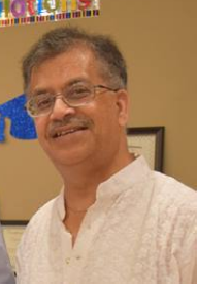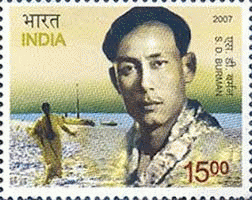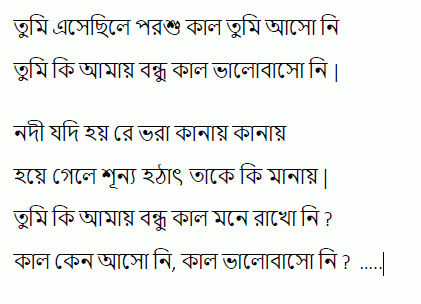The Unique Musical Creations of Kumar Sachin Dev Burman and Their Roots in the Reeds and Soil of Bengal- Part II
And his apparent estrangement from the Tagorean epoch
Monish R Chatterjee
On the subject of SDB's lifelong allegiance and closeness to the folk traditions of Bengal, there is an excellent interview by Sankarlal Bhattacharjee (whose transcript is available at the link appended to the end of this essay)- titled The Case for Folk Music, the interview focuses primarily on his experiences in the Bombay film industry. In the interview, he points out how the Bhatiali folk tradition of Bengal influenced him all his life. "My life in folk music is like a dream," SDB confesses. Elsewhere, he points out the importance of both Bhatiali and Baul in his development as a composer. He describes Bhatiali as "..earthly music, rooted in the soil it sprouts from." He differentiates Baul and Bhatiali as the former being an instrument narrating a philosophy, while the latter as one which depicts a mood, sometimes philosophical. A particularly noteworthy and daring assertion SDB makes in the interview is to claim that in his opinion not only are folk traditions around the world connected by threads of commonality, but that he believes European folk music in fact derived from those of India, especially Bengal. Here is an excerpt from the interview laying out SDB's observations in this regard: --(supplement(ing) my learning in Bengali folk music (unlike folk music elsewhere in India) wasn't possible with foreign folk music because my stay abroad has been sporadic and not for a considerable length of time. Still, the least I have seen of folk music abroad confirms my faith in the basic similarity of folk attitudes of all nations. In Russia, I remember, I was constantly reminded of our folk songs and classical ragas like Bhairavi and Jogiya or Todi whenever I listened to their folk music. In Spain too I had similar experiences. These cases give verity to the idea that the folk music of the continent was an importation from Asia. The nomads or gypsies (from India) took with them certain folk disciplines whenever they migrated from one region to another. As history has it, much of our folk excellences traveled with the gypsies when the moors raced up to the south-west of Europe. Spain's music imbibed some of our folk character in this way. To tell you frankly, to listen to folk music abroad is to be constantly reminded of India-- An absolutely remarkable observation from an outstanding musician/composer from India who carved out his own niche in India's mellifluous musical domain.
SDB's lifelong commitment to, and deep affection for Bengali folk music is evident from his admission that some of his very best hits in the course of his time in Bombay and musical compositions for Hindi films had their origins in Bengali folk music. In the Bhattacharjee interview he cites as examples, Safal hogi teri aradhana, kahe ko roye based on a Baul melody; Wahan kaun hai tera musafir jayega kahan based on Bhatiali (Bengali boatman music); even a much lighter number such as Roop tera mastana was apparently based on a favorite folk melody. And these are but a small sampling.
It is also mentioned in RM's article that even though he spent many years in Bombay in the entertainment world, his heart and soul pined for Bengal's rivers and fields, her drumbeats and her festivals, her rains and her moonlit nights. Despite his royal roots in Tripura, he truly identified with Bengal in the very fabric of his being. And this is the identity that I too have perceived in SDB's music from my very early years. In what follows, I present snippets of lyrics from SDB's songs imbued with Bengal's folk traditions with interpretations for context and atmosphere. In many of his songs, the lyricists were Ajay Bhattacharya, Sailen Roy and his (SDB's) wife Mira Dev Burman. The musical composers included SDB himself and also Himangshu Dutta.
(1)
Dearest- you came to see me the day before, you did not yesterday
Dearest, did you not, then, love me the same yesterday?
Imagine, dearest, a river brimming over with the tide-
Does it befit it, then, to abruptly become parched and dry?
Did you not, dearest, remember me at all yesterday?
Next Page 1 | 2 | 3 | 4 | 5 | 6 | 7 | 8
(Note: You can view every article as one long page if you sign up as an Advocate Member, or higher).







